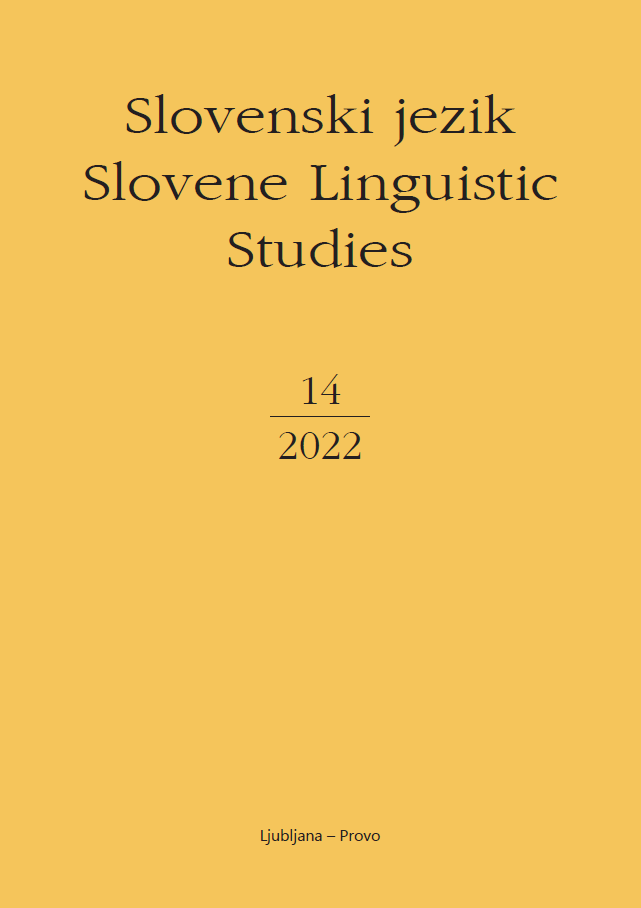Revision of Slovenian Normative Guide: Scientific Basis and Inclusion of the Public
DOI:
https://doi.org/10.3986/sjsls.14.1.07Keywords:
language standardisation, codification, Slovenian, normative guide, public discussionAbstract
Contemporary Slovenian language standardisation includes the revision of the normative guide, a process taking place since 2013 within the Commission on Orthography. This article presents an overview of the scientific basis of this process as well as describes the systematic inclusion of different segments of the public in the phase of assessing the suitability of current orthographic rules and formulating new ones. This is due to an awareness that a normative guide can be accepted by the wider language community only through a convergence of differing opinions and codification based on arguments.
Downloads
References
Crystal, David. 2012. Internet linguistics: a student guide. Abingdon, New York: Routledge.
Daneš, František. 1988. K dvěma základnim otázkám kodifikace. Naše řeč. 3–13.
Dobrovoljc, Helena, Jakop, Nataša. 2011. Sodobni pravopisni priročnik med normo in predpisom. Ljubljana: Založba ZRC.
Dobrovoljc, Helena, Bizjak Končar, Aleksandra. 2013. Slovenski pravopisi in vprašanje normativnih pristojnosti. Slovenski jezik – Slovene linguistic studies 9. 111–126.
Dolník, Juraj. 2010. Teória spisovného jazyka (so zreteľom na spisovnú slovenčinu). Bratislava: VEDA, vydavateľstvo Slovenskej akadémie vied.
Fairbrother, Lisa, Kimura, Goro Christoph. 2020. What is a language management approach to language problems and why do we need it? Goro Christoph Kimura, Lisa Fairbrother (eds): A Language Management Approach to Language Problems: Integrating macro and micro dimensions. John Benjamins Publishing Company. 1–28.
Frawley, William J. (ed.). 2003. International Encyclopedia of Linguistics. New York: Oxford University Press.
Garvin, Paul L. 1993. A conceptual framework for the study of language standardization. International Journal of the Sociology of Language 100–101. 37–54.
Haugen, Einar. 1966. Language conflict and language planning. The case of modern Norwegian. Cambridge, Mass.: Harvard University Press.
Jaffe, Alexandra. 2000. Introduction: Non-standard orthography and non-standard speech. Journal of Sociolinguistics 4. 497–513.
Jernudd, Björn Holger and Jiří Václav Neustupný. 1987. Language planning: for whom? Lorne Laforge (ed.): Actes du Colloque international sur l'aménagement linguistique / Proceedings of the International Colloquium on Language Planning. Québec: Les Presses de L'Université Laval. 69–84.
Lengar Verovnik, Tina. 2021. Pomen javne razprave ob predlogu novih pravopisnih pravil (povzetek). Škrabčevi dnevi 12. Zbornik povzetkov. 11. Available at http://skrabcevi-dnevi.zrc-sazu.si/Portals/19/Povzetki/2021-09-29-Skrabcevi-dnevi-12-povzetki.pdf.
Leith, Dick. 1983. A Social History of English. London: Routledge and Kegan Paul.
Ludányi, Zsófia. 2020. Language consulting: a brief European overview. Eruditio – Educatio vol. 15, n. 3. 25–47.
Majcenovič, Helena. 2003. Odzivnost javnosti ob izidu Slovenskega pravopisa (Izhodiščne teze I-V). Marko Jesenšek (ed.): Perspektive slovenistike ob vključevanju v Evropsko zvezo. Ljubljana: Slavistično društvo Slovenije. 213–217.
Mathesius, Vilem. (1929) 1983: Functional linguistics. J. Vachek (ed.): Praguiana, Some Basic and Less known Aspects of Prague Linguistics School. John Benjamins Publisching company. 137–138.
Milroy, James. 2001. Language ideologies and the consequences of standardization. Journal of Sociolinguistics 5/4: 530–555.
Mønnesland, Svein. 1998. Emerging Literary Standards and Nationalism. The Disintegration of Serbo-Croatian. Actas do I Simposio Internacional sobre o Bilingüismo. 1103–1113.
Nekvapil, Jiří. 2008. Language Cultivation in Developed Contexts. Bernard Spolsky, Francis M. Hult (eds): The Handbook of Educational Linguistics. Blackwell Publishing. 251– 265.
Nekvapil, Jiři. 2006. From language planning to language management. Sociolinguistica 20. 92–104.
Pučnik, Kristina M. 2018. Lektorska licenca in drugi poskusi regulacije poklica. Bela knjiga o prevajanju. Premiki na področju prevajanja, tolmačenja, podnaslavljanja in lektoriranja v Sloveniji. Available at: https://www.belaknjigaoprevajanju.si/.
Sebba, Mark. 2003. Spelling rebellion. Jannis K. Androutsopoulos, Alexandra Georgakopoulou (eds): Discourse Constructions of Youth Identities. Amsterdam/Philadelphia: John Benjamins. 151–173.
Sebba, Mark. 2007: Spelling and Society. The Culture and Politics of Orthography around the World. Cambridge: Cambridge University Press.
Sherman, Tamah. 2016. Language management and Language Management Theory [LMT]. Andrew Linn (ed.): Investigating English in Europe. Boston/Berlin: Walter de Gruyter. 192–199.
Tarp, Sven. 2008. Lexicography in the Borderland between Knowledge and Non-Knowledge: general lexicographical theory with particular focus on learner’s lexicography. Tübingen: M. Niemeyer.
Verovnik, Tina. 2005. Jezikovni obronki. Ljubljana: GV Založba.
Vogl, Ulrike. 2012. Multilingualism in a standard language culture. Standard Languages and Multilingualism in European History. 1–40.
Downloads
Published
Versions
- 2023-03-27 (3)
- 2022-12-08 (2)
- 2022-12-07 (1)
How to Cite
Issue
Section
License

This work is licensed under a Creative Commons Attribution-NonCommercial-NoDerivatives 4.0 International License.
Authors guarantee that the work is their own original creation and does not infringe any statutory or common-law copyright or any proprietary right of any third party. In case of claims by third parties, authors commit their self to defend the interests of the publisher, and shall cover any potential costs.
More in: Submission chapter





